Discover financial empowerment resources
Discover financial empowerment resources
As life expectancy in the U.S. increases, older adults will comprise a larger share of the population than ever before. At the same time, older adults will play an increasingly important role in the U.S. economy. Their contributions through consumption, labor, and unpaid activities—such as...

The Aspen Institute Financial Security Program hosted a public event, “Charting a Course Towards a More Inclusive Financial System: Our Collective Call to Action,” on Tuesday, December 5th 2023. At the event changemakers in government, industry, and nonprofits spoke about their role and...

The Future of Wealth Discussion Series consist of 1-hour virtual convenings that are open to the public and bring together leaders across sectors and disciplines to consider wealth-building objectives that Aspen FSP considers critical to creating widespread household financial well-being. Click on...

Widespread household financial insecurity is an undeniably urgent crisis in the United States today. A stunning 51 percent of U.S. households have expenses that are equal to or greater than their income, and 55 percent lack the necessary savings to weather a simultaneous income drop and expense...
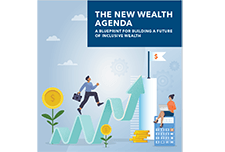
For most households in America, financial shocks are inevitable. The car will break down. The house will need a repair. A key earner for a household will be laid off. These shocks can be devastating to household finances. And while the COVID-19 pandemic, which we are still recovering from, was a...
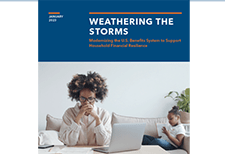
American Indian and Alaska Native (AI/AN) peoples have long faced barriers to asset building. More than half of AI/AN populations are un- or underbanked, financial services often don’t operate on reservations, and access to capital is difficult. Native peoples have been excluded from financial...

Having wealth, or a family’s assets minus their debts, is important not just for the rich— everyone needs wealth to thrive. Yet building the amount of wealth needed to thrive is a major challenge. Nearly 13 million U.S. households have negative net worth. Millions more are low wealth; they do...
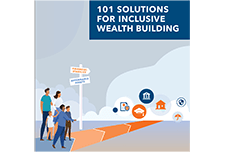
The financial hardships households faced in the midst of the pandemic reveals the scale of the precarity that millions of households were experiencing well before the crisis began. This highlights the urgency of the need to reimagine our system of benefits—both public and private—to effectively...

This brief outlines how beneficiaries are using online platforms to identify breakdowns in public services, celebrate the positive impact of public policy and urge reform. Ways in which government can capitalize on widespread social media feedback and begin to build long-term measures to center...
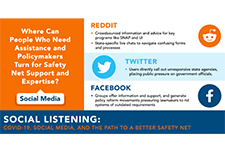
The unemployment rate for young workers ages 16–24 jumped from 8.4% to 24.4% from spring 2019 to spring 2020 in the United States, representing four million youth. While unemployment for their counterparts ages 25 and older rose from 2.8% to 11.3% the Spring 2020 unemployment rates were even...

Short-term cushions are key to longer-term financial security and well-being. This report shines a light on the central role that short-term financial stability plays in a person’s ability to reach broader financial security and upward economic mobility, a measurement of whether an...
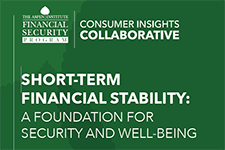
Aspen Financial Security Program’s the Expanding Prosperity Impact Collaborative (EPIC) has identified seven specific consumer debt problems that result in decreased financial insecurity and well-being. Four of the identified problems are general to consumer debt: households’ lack of savings...

In this video presentation David Mitchell from the Aspen Institute explains strategies for mitigating and preventing income volatility at the household level. This presentation was given at the Prosper Canada Policy Research Symposium on March 9, 2018. Read the slide deck that accompanies...
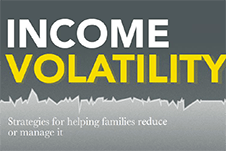
The research and policy symposium on income volatility was held on March 9, 2018, in Toronto, Ontario. Speakers from Canada and the United States present on key research findings on the nature of income and expense volatility in the early 21st Century. Speakers also suggest policy solutions to...

This is the second in a series of briefs produced by a partnership between the Aspen Institute’s Expanding Prosperity Impact Collaborative (EPIC), Washington University’s Center for Social Development (CSD), and the Intuit Tax and Financial Center. The first brief highlighted new data on the...
This report is on the results of a survey of 150+ experts on income volatility, its causes and impact, and what to do about...
EPIC’s first issue brief, “Income Volatility: A Primer,” was a comprehensive literature review of what is known about the prevalence, causes, and impacts of income volatility. This second brief looks at managing income volatility at both the household and societal levels. It presents a...
Income volatility is an emerging, critical issue for understanding financial security today. American households seem to be facing increased instability and unpredictability in their financial lives. Despite the efforts of scores of researchers, there is no consensus on the extent of volatility...
